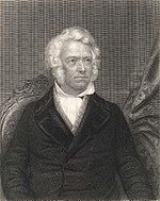
Leopold Gmelin
Encyclopedia
Leopold Gmelin was a German
chemist
.
Gmelin was the son of Johann Friedrich Gmelin
. He studied medicine
and chemistry
at Göttingen, Tübingen and Vienna
, and in 1813 began to lecture on chemistry at Heidelberg, where in 1814 he was appointed extraordinary-, and in 1817 ordinary-, professor
of chemistry and medicine. He was the discoverer of potassium ferricyanide
(1822), and wrote the Handbuch der Chemie (first edition 1817–1819, 4th ed. 1843-1855), an important work in its day, which was translated into English
for the Cavendish Society by Henry Watts
in 1848-1850. He resigned his chair in 1852, leaving Robert Bunsen
to succeed him, and died in Heidelberg
.
Germany
Germany , officially the Federal Republic of Germany , is a federal parliamentary republic in Europe. The country consists of 16 states while the capital and largest city is Berlin. Germany covers an area of 357,021 km2 and has a largely temperate seasonal climate...
chemist
Chemist
A chemist is a scientist trained in the study of chemistry. Chemists study the composition of matter and its properties such as density and acidity. Chemists carefully describe the properties they study in terms of quantities, with detail on the level of molecules and their component atoms...
.
Gmelin was the son of Johann Friedrich Gmelin
Johann Friedrich Gmelin
Johann Friedrich Gmelin was a German naturalist, botanist, entomologist, herpetologist and malacologist.- Education :Johann Friedrich Gmelin was born as the eldest son of Philipp Friedrich Gmelin in 1748 in Tübingen...
. He studied medicine
Medicine
Medicine is the science and art of healing. It encompasses a variety of health care practices evolved to maintain and restore health by the prevention and treatment of illness....
and chemistry
Chemistry
Chemistry is the science of matter, especially its chemical reactions, but also its composition, structure and properties. Chemistry is concerned with atoms and their interactions with other atoms, and particularly with the properties of chemical bonds....
at Göttingen, Tübingen and Vienna
University of Vienna
The University of Vienna is a public university located in Vienna, Austria. It was founded by Duke Rudolph IV in 1365 and is the oldest university in the German-speaking world...
, and in 1813 began to lecture on chemistry at Heidelberg, where in 1814 he was appointed extraordinary-, and in 1817 ordinary-, professor
Professor
A professor is a scholarly teacher; the precise meaning of the term varies by country. Literally, professor derives from Latin as a "person who professes" being usually an expert in arts or sciences; a teacher of high rank...
of chemistry and medicine. He was the discoverer of potassium ferricyanide
Potassium ferricyanide
Potassium ferricyanide is the chemical compound with the formula K3[Fe6]. This bright red salt contains the octahedrally coordinated [Fe6]3− ion. It is soluble in water and its solution shows some green-yellow fluorescence.-Preparation:...
(1822), and wrote the Handbuch der Chemie (first edition 1817–1819, 4th ed. 1843-1855), an important work in its day, which was translated into English
English language
English is a West Germanic language that arose in the Anglo-Saxon kingdoms of England and spread into what was to become south-east Scotland under the influence of the Anglian medieval kingdom of Northumbria...
for the Cavendish Society by Henry Watts
Henry Watts (chemist)
-Life:He was born in London on 20 January 1815. He went to a private school, and was articled at the age of fifteen as an architect and surveyor; but went on to support himself by teaching, chiefly mathematical, privately and at a school. He then attended University College, London. In 1841 he...
in 1848-1850. He resigned his chair in 1852, leaving Robert Bunsen
Robert Bunsen
Robert Wilhelm Eberhard Bunsen was a German chemist. He investigated emission spectra of heated elements, and discovered caesium and rubidium with Gustav Kirchhoff. Bunsen developed several gas-analytical methods, was a pioneer in photochemistry, and did early work in the field of organoarsenic...
to succeed him, and died in Heidelberg
Heidelberg
-Early history:Between 600,000 and 200,000 years ago, "Heidelberg Man" died at nearby Mauer. His jaw bone was discovered in 1907; with scientific dating, his remains were determined to be the earliest evidence of human life in Europe. In the 5th century BC, a Celtic fortress of refuge and place of...
.

